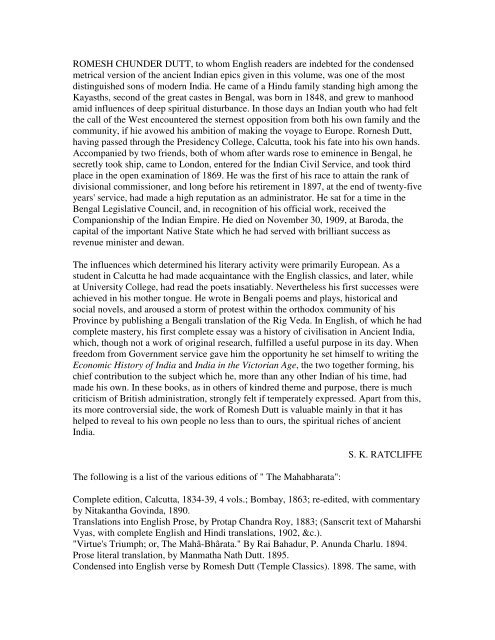MAHABHARATA CONDENSED INTO ENGLISH ... - Mandhata Global
MAHABHARATA CONDENSED INTO ENGLISH ... - Mandhata Global
MAHABHARATA CONDENSED INTO ENGLISH ... - Mandhata Global
You also want an ePaper? Increase the reach of your titles
YUMPU automatically turns print PDFs into web optimized ePapers that Google loves.
ROMESH CHUNDER DUTT, to whom English readers are indebted for the condensed<br />
metrical version of the ancient Indian epics given in this volume, was one of the most<br />
distinguished sons of modern India. He came of a Hindu family standing high among the<br />
Kayasths, second of the great castes in Bengal, was born in 1848, and grew to manhood<br />
amid influences of deep spiritual disturbance. In those days an Indian youth who had felt<br />
the call of the West encountered the sternest opposition from both his own family and the<br />
community, if hie avowed his ambition of making the voyage to Europe. Rornesh Dutt,<br />
having passed through the Presidency College, Calcutta, took his fate into his own hands.<br />
Accompanied by two friends, both of whom after wards rose to eminence in Bengal, he<br />
secretly took ship, came to London, entered for the Indian Civil Service, and took third<br />
place in the open examination of 1869. He was the first of his race to attain the rank of<br />
divisional commissioner, and long before his retirement in 1897, at the end of twenty-five<br />
years' service, had made a high reputation as an administrator. He sat for a time in the<br />
Bengal Legislative Council, and, in recognition of his official work, received the<br />
Companionship of the Indian Empire. He died on November 30, 1909, at Baroda, the<br />
capital of the important Native State which he had served with brilliant success as<br />
revenue minister and dewan.<br />
The influences which determined his literary activity were primarily European. As a<br />
student in Calcutta he had made acquaintance with the English classics, and later, while<br />
at University College, had read the poets insatiably. Nevertheless his first successes were<br />
achieved in his mother tongue. He wrote in Bengali poems and plays, historical and<br />
social novels, and aroused a storm of protest within the orthodox community of his<br />
Province by publishing a Bengali translation of the Rig Veda. In English, of which he had<br />
complete mastery, his first complete essay was a history of civilisation in Ancient India,<br />
which, though not a work of original research, fulfilled a useful purpose in its day. When<br />
freedom from Government service gave him the opportunity he set himself to writing the<br />
Economic History of India and India in the Victorian Age, the two together forming, his<br />
chief contribution to the subject which he, more than any other Indian of his time, had<br />
made his own. In these books, as in others of kindred theme and purpose, there is much<br />
criticism of British administration, strongly felt if temperately expressed. Apart from this,<br />
its more controversial side, the work of Romesh Dutt is valuable mainly in that it has<br />
helped to reveal to his own people no less than to ours, the spiritual riches of ancient<br />
India.<br />
The following is a list of the various editions of " The Mahabharata":<br />
S. K. RATCLIFFE<br />
Complete edition, Calcutta, 1834-39, 4 vols.; Bombay, 1863; re-edited, with commentary<br />
by Nitakantha Govinda, 1890.<br />
Translations into English Prose, by Protap Chandra Roy, 1883; (Sanscrit text of Maharshi<br />
Vyas, with complete English and Hindi translations, 1902, &c.).<br />
"Virtue's Triumph; or, The Mahâ-Bhârata." By Rai Bahadur, P. Anunda Charlu. 1894.<br />
Prose literal translation, by Manmatha Nath Dutt. 1895.<br />
Condensed into English verse by Romesh Dutt (Temple Classics). 1898. The same, with
















